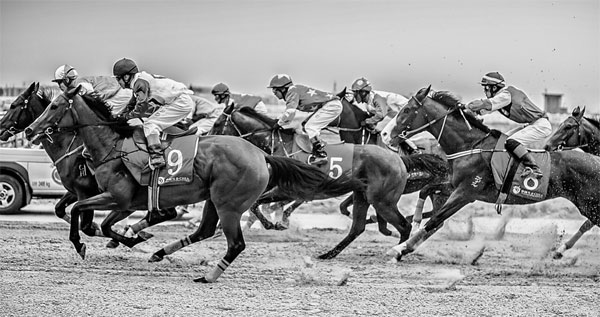Grand national pursuit
Updated: 2015-09-18 07:42
By Wang Kaihao(China Daily USA)
|
||||||||
|
Equestrian sports are attracting growing attention among Chinese. Photos Provided To China Daily |
As enthusiasm for thoroughbred racing grows across the country, Wuhan will host the fourth China Equine Cultural Festival this weekend. Wang Kaihao reports.
Teo Ah Khing, a Chinese-Malaysian architect, is helping to make something out of almost nothing in the Chinese mainland.
In 2013, when he staged the first China Equine Cultural Festival in Hohhot, capital of the Inner Mongolia autonomous region, attracting horse owners with 39 thoroughbreds to participate, there was a widespread misconception in China about thoroughbred racing.
"Thoroughbred racing doesn't necessarily have anything to do with betting," he says, trying to allay fears that once you have horses racing around a track, the next step is gambling.
"What I am talking about is a high value-added industry benefiting agriculture and creating jobs. It has just started in China."
On the eve of the next edition of the festival, which will be held on Saturday in Wuhan, capital of Hubei province, Teo exudes confidence.
This is the fourth time the festival has been held, and five thoroughbred races will be held that day.
Wuhan made a tentative attempt to hold thoroughbred racing in 2008, which had disappeared in the Chinese mainland after 1949.
The festival will feature the announcement that China will send its best jockeys to the top training centers in the Americas for about half a year.
The jockeys will have the chance to participate in racing in the Caribbean during the Northern Hemisphere winter.
The festival will also work with Wuhan Business University to offer undergraduate programs that nurture more expertise in the thoroughbred racing industry with overseas financial and technical resources.
The university is the first college in the Chinese mainland with equestrian majors. About 600 students have graduated from the school since 2008, says Li Zuoqing, president of the university.
Teo adds that this new start will possibly change into curriculum and internship programs in more schools in future.
Teo founded the China Horse Club in 2012 to promote a lifestyle closely connected to horse racing for Chinese elites. The thoroughbred industry has stirred great interest among Chinese investors since then.
"We see today a genuine interest from Chinese people for equestrian sports," says Juan-Carlos Capelli, vice-president of Longines, the major timekeeper in the global equestrian industry, who is also one of the sponsors of the China Equine Cultural Festival.
"Indeed, the number of spectators attending and Chinese riders participating in these events (race meetings) is significantly increasing."
Though China's horse-industry authorities say they have no details on how many private horse owners the country has, Teo predicts the number will grow.
Teo's horse club has more than 200 members, compared with less than 40 when it was founded.
"Three years ago, most Chinese buyers were humble, and are maybe willing to pay 100,000 yuan ($15,700) buying a racehorse from overseas. But now, some are willing to pay 400,000 Australian dollars ($284,000)."
Prize money is obviously a strong attraction for those who invest in horses, not least because it helps cover the considerable expenses in employing trainers and jockeys, he says.
He once offered a 1 million-yuan prize for a race during the 2013 festival in Hohhot, which was a record in the Chinese mainland. The highest prize in Wuhan is 500,000 yuan.
"It was too much higher than other race meetings at that time," he says, smiling.
The bright prospects for Chinese thoroughbred owners are about far more than prize money. His club's members can share and own the world's top stallions.
"China has many billionaires buying tourist sites or chateaus overseas. But buying stallions is to sow seeds, to harvest in the future."
He has a dream that China will have the world's largest number of stallions in five years.
Last year, Teo's club became the first Chinese equine club sending racehorses with Chinese ID cards overseas. Previous winners of the China Equine Cultural Festival - Beat of the Drum, The Ferryman and Alcott - were exported to the United States and now race in California.
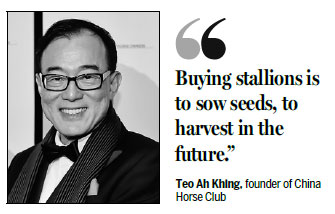
"I meet people (in China) with the necessary interest, passion and enthusiasm to drive the industry to become an integral part of Chinese sporting culture," says Tom Magnie of Coolmore Australia, the world's leading thoroughbred breeder.
"I feel that it (the China Equine Cultural Festival) is a must-see spectacle for the people of China."
Lack of an internationally recognized quarantined area for equestrian disease in the mainland, an old problem for the Chinese horse industry, has recently been partially solved. Shanghai established two temporary quarantine districts, to which Chinese horses will be sent before they go overseas.
Still, professionals believe there is room for improvement.
"It is urgent to develop a coordinated program of races with good prize money incorporating all the principal racecourses in China under a national horse racing authority," says Louis Romanet, president of the International Federation of Horseracing Authorities.
Teo is cheered to see regulations being established in China, and he says international practices of the thoroughbred industry have been introduced in the past two years. But complete, national, uniform rules are still absent.
"Perhaps, first of all, we need live broadcasting of thoroughbred racing on China's mainstream television, which has never been realized before," says the equestrian veteran, who hopes this can be achieved at next year's festival.
"The work will be much easier when it's recognized by the public through mass media."
Contact the writer at wangkaihao@chinadaily.com.cn
- UN chief: Those blocking fleeing refugees should 'stand in their shoes'
- Hungarian riot police detain migrants
- IOC announces five cities bid for 2024 summer Olympic
- Japan opposition to halt vote on security bills
- Japan protesters rally as security bills near passage
- Australia launches first air strikes against IS

 House showcasing Sino-American friendship open
House showcasing Sino-American friendship open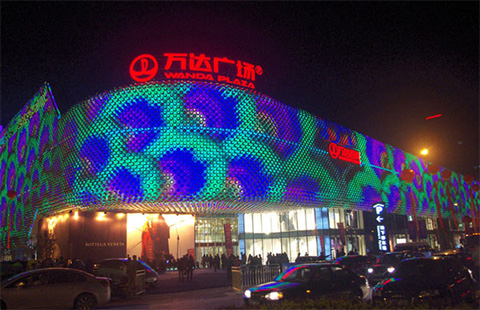
 Top 10 M&A deals between China and US in 2015
Top 10 M&A deals between China and US in 2015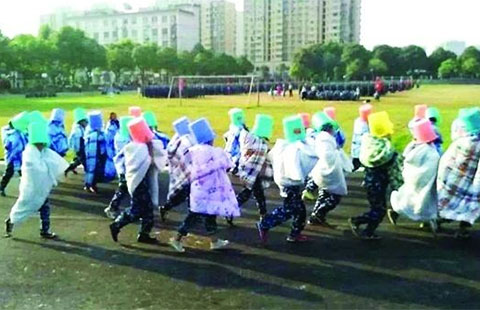
 Messy dorm earns grueling punishinment for students
Messy dorm earns grueling punishinment for students
 Seven killed in landslide in SW China
Seven killed in landslide in SW China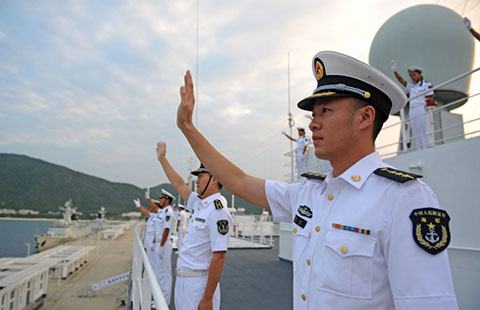
 Chinese forces arrive in Malaysia for military exercise
Chinese forces arrive in Malaysia for military exercise
 Top 10 M&A deals between China and US in 2015
Top 10 M&A deals between China and US in 2015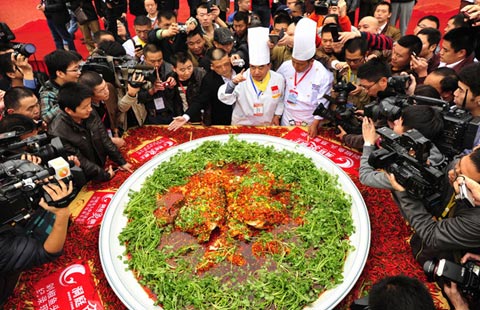
 Delicious bites in record-breaking sizes
Delicious bites in record-breaking sizes
 An interview with Pilar Laguana: Introducing the island of Guam to China
An interview with Pilar Laguana: Introducing the island of Guam to China
Most Viewed
Editor's Picks

|

|

|

|

|

|
Today's Top News
President stresses Sino-US harmony
LA-Las Vegas link gets help
US CEOs give nod to BIT
Economy worries prompt Fed to hold rates steady
Google demos online marketing strategies to support Chinese SMEs
The ancient city takes a new route along the Silk Road
Villagers angry at verdict on fatal fire
Promoting the landscapes of China
US Weekly

|

|
